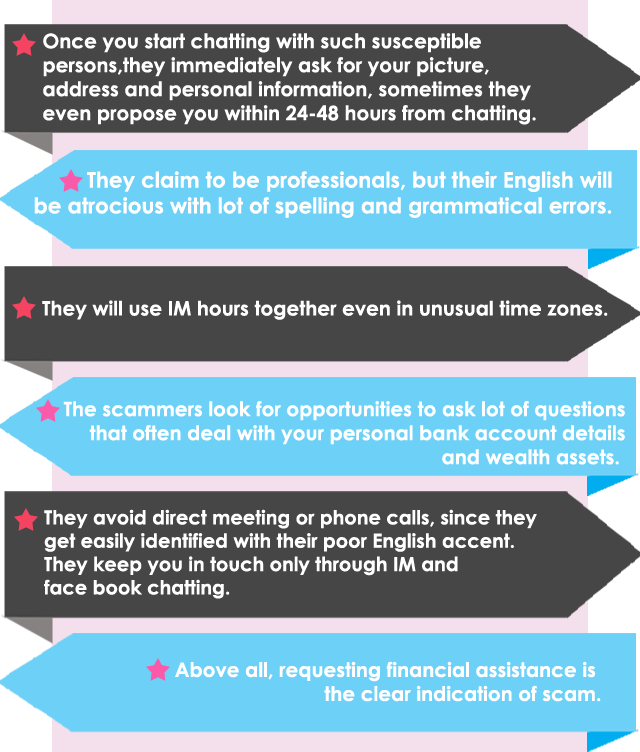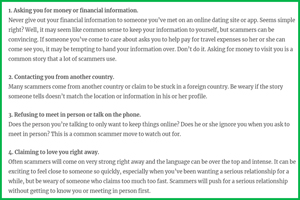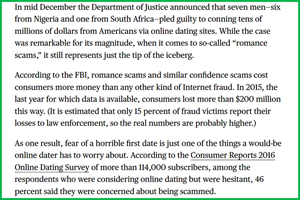Online Dating Scams
Explore tips to protect yourself from online dating scams. Understand common deceptive practices, safeguard your personal information, and ensure a secure digital dating experience. Stay informed and practice cyber-safety in your online relationships.
Online Dating Scams: The Dark Side of Virtual Connections
Whether you're a professional or a businessperson seeking a soul mate through online dating websites, this article is crucial for you. While the internet offers numerous dating platforms to find a potential companion, it's not always a safe haven. Online dating scammers lurk, waiting to exploit and strip you of your assets and personal information. These skilled catfishers excel at deception, using romantic speeches to manipulate and extract money from lonely individuals exploring online dating with hopes of finding a life partner. This article serves as a warning against catfishers, aiming to protect you from falling victim to online dating scams.
How online dating scammers spin trap for you:
 Online dating scams are not isolated incidents; they operate as organized networks with a hierarchical structure that includes leaders, managers, and workers. Their expansive web spans the internet, making it their primary tool for ensnaring victims. These scammers initiate contact online, posing as individuals genuinely interested in you. They create deceptive profiles, often claiming to be foreign citizens or NRIs, weaving elaborate tales to evoke sympathy. Presenting themselves as working men or women seeking a life partner, they engage in heartfelt conversations to earn your trust. Gradually, they extract personal information and bank details. Once a rapport is established, they manipulate victims into paying for various reasons.
Online dating scams are not isolated incidents; they operate as organized networks with a hierarchical structure that includes leaders, managers, and workers. Their expansive web spans the internet, making it their primary tool for ensnaring victims. These scammers initiate contact online, posing as individuals genuinely interested in you. They create deceptive profiles, often claiming to be foreign citizens or NRIs, weaving elaborate tales to evoke sympathy. Presenting themselves as working men or women seeking a life partner, they engage in heartfelt conversations to earn your trust. Gradually, they extract personal information and bank details. Once a rapport is established, they manipulate victims into paying for various reasons.
Online dating scams often involve scammers requesting money for various reasons, such as education fees, visa fees, and other purported legal expenses. In more severe instances, victims may encounter fake medical professionals claiming urgent surgical needs or immediate medical assistance for a loved one. According to the FBI (Federal Bureau of Investigation), individuals worldwide are losing substantial amounts, with reported losses exceeding $400,000 in these types of online dating scams.
Targeting Emotionally Vulnerable Individuals:
Scammers often prey on emotionally vulnerable individuals, including divorcees, widows, widowers, and those with disabilities, who may be well-off and established. These manipulative fraudsters are well aware that such individuals seek emotional support, love, and care. Consequently, dating scammers falsely present themselves as widows, widowers, or divorcees to evoke sympathy and prompt quick responses.
Signs of online dating scammers:
Protect Yourself from Online Dating Scams:
- Avoid sharing personal information on social networking sites to minimize the risk of exposure.
- Exercise caution when chatting with unfamiliar individuals, refraining from divulging sensitive details like bank account numbers and contact information.
- If you feel emotionally manipulated, consider terminating the contact.
- Never send money without proper verification.
- If threatened for not sending money, seek assistance from law enforcement.
The Dark Side of Online Dating: Navigating the Sophisticated Web of Scams
Online dating scams have evolved into a sophisticated network targeting vulnerable individuals seeking companionship. These scammers, often organized with a hierarchical structure, strategically exploit emotions to extract personal and financial information.
The elaborate schemes may involve scammers posing as foreign citizens or NRIs, weaving intricate tales of love and commitment. Victims, often divorced, widowed, or differently-abled individuals, become easy targets due to their emotional vulnerability.
Once a rapport is established, scammers may fabricate urgent situations, such as medical emergencies or education expenses, persuading victims to send substantial sums of money. The FBI reports that victims worldwide have collectively lost millions to these deceptive online dating practices.
It's essential for individuals navigating the online dating landscape to exercise caution, avoid divulging personal information, and verify the authenticity of their virtual connections. Awareness and vigilance are key to thwarting these emotionally manipulative scams.










